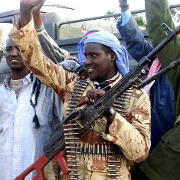 |
| (Story photo courtesy Compass Direct) |
The decision came last week, and Open Doors USA President/CEO David Curry says it's not clear why this designation took so long.
"What is clear is that across the board, our government seems to be hesitating on calling out Christian persecution, wherever it's happening across the globe," says Curry.
"[The U.S. has] some geopolitical connections with these governments, in many, many cases, but yet we're not encouraging them to crack down, try to protect Christians where persecution is happening."
Boko Haram, whose name means "Western education is sin," has been attacking churches and believers in northern Nigeria since 2009. The U.S. State Department designated three of Boko Haram's top leaders as terrorists in June 2012, but stopped short of applying the label to the entire group.
"We would love to see more responsiveness on this point, and really calling it what it is when it happens, wherever it happens," says Curry.
According to an official statement issued last Wednesday, the terror designations forbid a provision of "material resources" to Boko Haram and splinter group Ansaru.
"Without these kinds of designations, I don't think people take them seriously," Curry explains.
"They sort of sense that maybe they're random; but these aren't random attacks. These are planned attacks; these are targeted attacks in the northern part of Nigeria to eliminate, to squeeze out, Christianity in those regions."
Curry hopes the designation means more than just words on paper.
"We hope that there'll be dollars available, that there'll be anti-terrorist training continuing for some of their police forces and military forces that will help to protect Christians there," Curry states.
But the actions of Nigerian Christians speak volumes.
"Christians are praying there; they're holding together in unity," says Curry. "They are saying, 'We have to find a spiritual solution, because a practical, physical solution seems to be so slow here on the ground'."
Will you join them?
"Pray for those families that have been directly affected by loss of life," Curry suggests.
"There are people, entire congregations, who've lost their church, their pastors have been killed. We want the freedom for people to go to church without fear of being hurt, without fear of the church being bombed.
"These are simple things that we don't even think twice about here in the States, but would be very important things to pray for--not just in Nigeria, but around the world."





